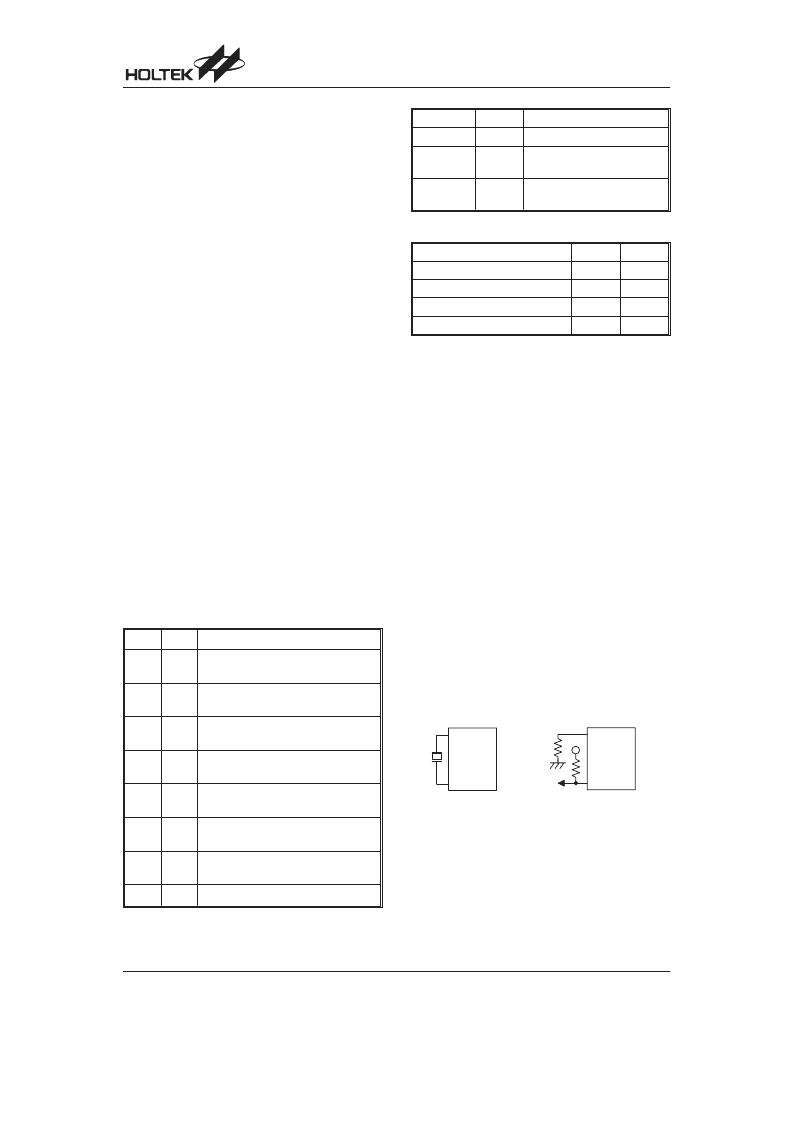- 您現(xiàn)在的位置:買(mǎi)賣(mài)IC網(wǎng) > PDF目錄385405 > HT86070 (Holtek Semiconductor Inc.) Voice Synthesizer 8-Bit MCU PDF資料下載
參數(shù)資料
| 型號(hào): | HT86070 |
| 廠商: | Holtek Semiconductor Inc. |
| 英文描述: | Voice Synthesizer 8-Bit MCU |
| 中文描述: | 語(yǔ)音合成器8位微控制器 |
| 文件頁(yè)數(shù): | 13/40頁(yè) |
| 文件大小: | 256K |
| 代理商: | HT86070 |
第1頁(yè)第2頁(yè)第3頁(yè)第4頁(yè)第5頁(yè)第6頁(yè)第7頁(yè)第8頁(yè)第9頁(yè)第10頁(yè)第11頁(yè)第12頁(yè)當(dāng)前第13頁(yè)第14頁(yè)第15頁(yè)第16頁(yè)第17頁(yè)第18頁(yè)第19頁(yè)第20頁(yè)第21頁(yè)第22頁(yè)第23頁(yè)第24頁(yè)第25頁(yè)第26頁(yè)第27頁(yè)第28頁(yè)第29頁(yè)第30頁(yè)第31頁(yè)第32頁(yè)第33頁(yè)第34頁(yè)第35頁(yè)第36頁(yè)第37頁(yè)第38頁(yè)第39頁(yè)第40頁(yè)

HT86030/HT86070
Rev. 1.10
13
May 25, 2006
During the execution of an interrupt subroutine, other in-
terrupt acknowledges are held until the RETI instruction
is executed or the EMI bit and the related interrupt con-
trol bit are set to 1 (of course, if the stack is not full). To
return from the interrupt subroutine, the RET or RETI in-
struction may be invoked. RETI will set the EMI bit to en-
able an interrupt service, but RET will not.
Interrupts occurring in the interval between the rising
edges of two consecutive T2 pulses, will be serviced on
the latter of the two T2 pulses, if the corresponding inter-
rupts are enabled. In the case of simultaneous requests,
the following table shows the priority that is applied.
These can be masked by resetting the EMI bit.
The Timer/Event Counter 0/1 interrupt request flag
(T0F/T1F) which enables Timer/Event Counter 0/1 con-
trol bit (ET0I/ET1I), the Timer Counter 3 interrupt re-
quest flag (T3F) which enables Timer Counter 3 control
bit (ET3I), and external interrupt request flag (EIF)
which enables external interrupt control bit (EEI) form
the interrupt control register (INTC:0BH and
INTCH:1EH). EMI, EEI, ET0I, ET1I and ET3I are used
to control the enabling/disabling of interrupts. These bits
prevent the requested interrupt begin serviced. Once
the interrupt request flags (T0F, T1F, T3F, EIF) are set,
they will remain in the INTC/INTCH register until the in-
terrupts are serviced or cleared by a software instruc-
tion.
It is recommended that application programs do not use
CALL subroutines within an interrupt subroutine. Inter-
rupts often occur in an unpredictable manner or need to
be serviced immediately in some applications. If only
one stack is left and the interrupt enable is not well con-
trolled, once a CALL subroutine if used in the interrupt
subroutine will corrupt the original control sequence.
Bit No. Label
Function
0
EMI
Controls the master (global) interrupt
(1= enabled; 0= disabled)
1
EEI
Controls the external interrupt
(1= enabled; 0= disabled)
2
ET0I
Controls the timer 0 interrupt
(1= enabled; 0= disabled)
3
ET1I
Controls the timer 1 interrupt
(1= enabled; 0= disabled)
4
EIF
External interrupt request flag
(1= active; 0= inactive)
5
T0F
Timer 0 request flag
(1= active; 0= inactive)
6
T1F
Timer 1 request flag
(1= active; 0= inactive)
7
Unused bit, read as 0
INTC (0BH) Register
Bit No.
Label
Function
0, 2~4, 6~7
Unused bit, read as 0
1
ET3I
Controls the timer 3 interrupt
(1= enabled; 0= disabled)
5
T3F
Timer 3 interrupt request flag
(1= active; 0= inactive)
INTCH (1EH) 1 Register
Interrupt Source
Priority
Vector
External Interrupt
1
04H
Timer/Event Counter 0 Overflow
2
08H
Timer/Event Counter 1 Overflow
3
0CH
Timer Counter 3 Overflow
4
14H
Oscillator Configuration
The HT86030/HT86070 provides two types of oscillator
circuit for the system clock, i.e., RC oscillator and crystal
oscillator. No matter what type of oscillator, the signal is
used for the system clock. The HALT mode stops the
system oscillator and ignores external signal to con-
serve power. If the RC oscillator is used, an external re-
sistor between OSC1 and VSS is required, and the
range of the resistance should be from 30k
The system clock, divided by 4, is available on OSC2
with pull-high resistor, which can be used to synchronize
external logic. The RC oscillator provides the most cost
effective solution. However, the frequency of the oscilla-
tion may vary with VDD, temperature, and the chip itself
due to process variations. It is therefore not suitable for
timing sensitive operations where accurate oscillator
frequency is desired.
to 680k .
On the other hand, if the crystal oscillator is selected, a
crystalacrossOSC1andOSC2isneededtoprovidethe
feedback and phase shift required for the oscillator, and
no other external components are required. Aresonator
may be connected between OSC1 and OSC2 to replace
the crystal and to get a frequency reference, but two ex-
ternal capacitors in OSC1 and OSC2 are required.
"
, '
, ,
'
, ,
%
&
) *
System Oscillator
相關(guān)PDF資料 |
PDF描述 |
|---|---|
| HT8656 | Talking Back |
| HT8658 | Voice Recorder (DRAM) |
| HT86768 | Voice Synthesizer 8-Bit MCU |
| HT86072 | Voice Synthesizer 8-Bit MCU |
| HT86144 | Voice Synthesizer 8-Bit MCU |
相關(guān)代理商/技術(shù)參數(shù) |
參數(shù)描述 |
|---|---|
| HT86072 | 制造商:HOLTEK 制造商全稱:Holtek Semiconductor Inc 功能描述:Voice Synthesizer 8-Bit MCU |
| HT86072(68PLCC) | 制造商:未知廠家 制造商全稱:未知廠家 功能描述:Microcontroller |
| HT86144 | 制造商:HOLTEK 制造商全稱:Holtek Semiconductor Inc 功能描述:Voice Synthesizer 8-Bit MCU |
| HT86144(68PLCC) | 制造商:未知廠家 制造商全稱:未知廠家 功能描述:Microcontroller |
| HT86192 | 制造商:HOLTEK 制造商全稱:Holtek Semiconductor Inc 功能描述:Voice Synthesizer 8-Bit MCU |
發(fā)布緊急采購(gòu),3分鐘左右您將得到回復(fù)。